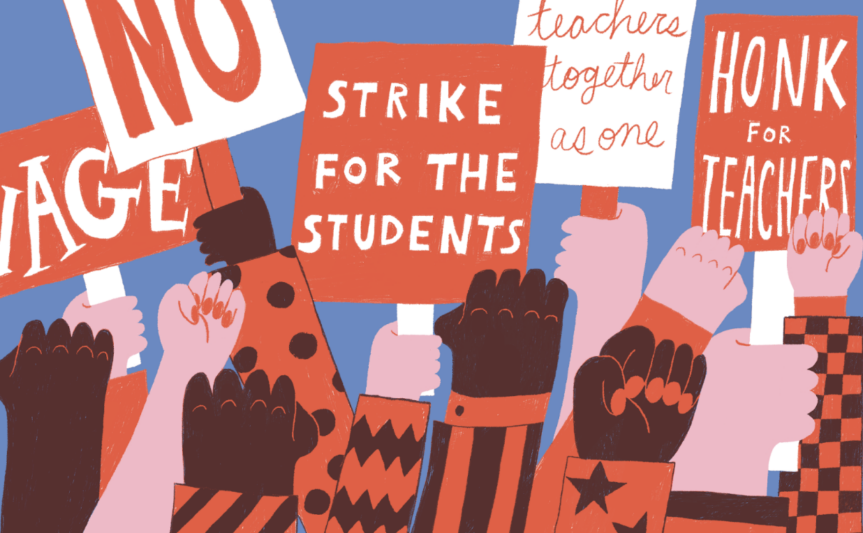By: Alejandra Lopez-Herrera, Oakland Scholars, Energy Convertors
Education is the bedrock of any thriving society, and the role of teachers in shaping young minds cannot be overstated. In recent years, teacher strikes have become increasingly common, highlighting the longstanding issues plaguing our education system. The teacher strike in Oakland, as exemplified by “OUSD strike: Oakland high school seniors face high stakes during teacher walkout” in the San Francisco Chronicle and “Oakland teachers strike to raise some of the state’s lowest salaries,” in EdSource, shed light on the consequences these strikes have on scholar learning. However, when teachers go on strike, it can have a profound impact on scholar learning. In the case of the recent Oakland Unified School District (OUSD) strike, the consequences were felt by high school seniors, who were forced to navigate high stakes during the teacher walkout.
The Impact of Teacher Strikes on Scholar Learning
Teacher strikes interfere with students’ ability to continue their education and may negatively affect their academic development over time. The learning environment suffers when qualified teachers are not present in the classroom due to a strike because the hole left by their absence is challenging to replace.
The San Francisco Chronicle article discusses the difficulties seniors face, particularly with relation to college applications and standardized testing. Students may miss vital lessons, tests, or assistance during a teacher strike that is essential to their academic progress. This might have an impact on their long-term educational trajectory by causing knowledge gaps and lower performance. Additionally, because of the uncertainty brought on by a strike, students would endure mental anguish and anxiety, which would further impair their ability to concentrate.
Data from the EdSource article discusses the inadequate salaries for teachers. Low pay can cause burnout and eventually affect the standard of instruction given to students. Teachers can find it difficult to devote themselves to their work when they are struggling financially, which lowers their motivation and increases the likelihood of turnover. These elements, along with the disturbance brought on by strikes, worsens the effect on student learning.
My Thoughts and Concerns
The issue of teacher strikes raises several concerns regarding quality and equity in education. A school is often the primary source of academic help, sustenance, and stability for students from underprivileged homes. These students are particularly impacted by teacher strikes because many lack access to private tutoring or alternative options. As a result, disadvantaged students fall further behind their more fortunate peers and the achievement gap grows, aggravating already existing educational imbalances.
The general morale and sense of community in schools can also be harmed by teacher strikes. Parents and students may feel alienated from and disappointed by the educational system, which undermines their trust and participation. In order for students to succeed academically and emotionally, it is imperative that the learning environment be consistent and encouraging. Beyond the time of the strike, the long-term effects of delayed education could have an impact on students’ future possibilities and society contributions.
Recommendations For Accountability:
Systemic Accountability
To address systemic issues that contribute to teacher strikes, it is essential to prioritize adequate and equitable funding for education. To guarantee competitive compensation for teachers and lower the likelihood of strikes, governments and school districts should invest in education systems. To address educators’ concerns and stop complaints from turning into strikes, officials also need to open up lines of communication with them.
Educator Accountability
To promote educator accountability, school districts should establish clear performance evaluation systems that ensure high-quality teaching. Teachers can strengthen their abilities, stay motivated, and enjoy their jobs by participating in mentorship programs, professional development opportunities, and regular reviews. To prevent strikes and advance student learning, it is essential to foster an environment where instructors feel appreciated and supported.
End User Accountability
Parents, scholars, and the community must actively engage in the education system and hold all stakeholders accountable. A sense of ownership and shared responsibility can be fostered through establishing open lines of communication between schools and parents, encouraging parental participation in decision-making processes, and fostering community collaborations. End users can contribute to the identification and resolution of problems before they develop into strikes by actively engaging in the educational system.
Conclusion
Teacher strikes have a negative effect on students’ learning and present serious problems for the educational system. Strike-related interruptions can result in knowledge gaps, emotional anguish, and long-term negative impacts on academics. To prevent strikes and provide continuous and equitable education for all, it is essential to address systemic accountability, instructor accountability, and end-user accountability. By putting these suggestions into practice, we can create a secure, encouraging, and prosperous learning environment for students, which ultimately paves the way for a more promising future for our society as a whole.

